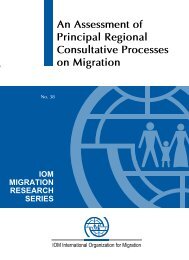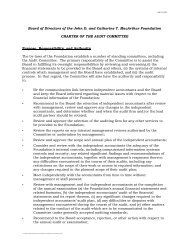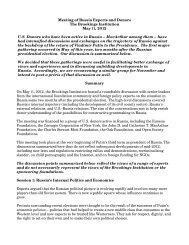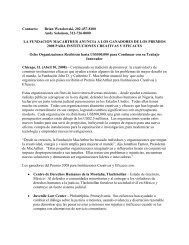A Global Compact on Learning - Brookings Institution
A Global Compact on Learning - Brookings Institution
A Global Compact on Learning - Brookings Institution
You also want an ePaper? Increase the reach of your titles
YUMPU automatically turns print PDFs into web optimized ePapers that Google loves.
87<br />
M. A. Rihani, Keeping the Promise: Five Benefits of Girls’ Sec<strong>on</strong>dary Educati<strong>on</strong> (Washingt<strong>on</strong>: Academy for Educati<strong>on</strong>al Development, 2006), http://<br />
www.aed.org/Publicati<strong>on</strong>s/upload/Girls-Ed-Final.pdf<br />
88<br />
L. Schweinhart et al., Lifetime Effects: The HighScope Perry Preschool Study through Age 40—M<strong>on</strong>ograph of the HighScope Educati<strong>on</strong>al Research<br />
Foundati<strong>on</strong> (Ypsilanti, Mich.: HighScope Press, 2005).<br />
89<br />
UNESCO, EFA <str<strong>on</strong>g>Global</str<strong>on</strong>g> M<strong>on</strong>itoring Report 2007.<br />
90<br />
C. Card<strong>on</strong>a et al., Home-Based Community Day Care and Children’s Rights: The Colombian Case (Bogotá: UNICEF, 1993).<br />
91<br />
World Bank, <strong>Learning</strong> for All: Investing in People’s Knowledge and Skills to Promote Development—World Bank Educati<strong>on</strong> Strategy 2010–2020<br />
(Washingt<strong>on</strong>: World Bank, 2010).<br />
92<br />
UNESCO, EFA <str<strong>on</strong>g>Global</str<strong>on</strong>g> M<strong>on</strong>itoring Report 2011.<br />
93<br />
Akhter Ahmed, Impact of Feeding Children in School: Evidence from Bangladesh (Washingt<strong>on</strong>: Internati<strong>on</strong>al Food Policy Research Institute, 2004);<br />
Aga Khan Foundati<strong>on</strong>, Improving <strong>Learning</strong> Achievement.<br />
94<br />
Committee <strong>on</strong> the Rights of the Child, “General Comment No. 7, Implementing Child Rights in Early Childhood (Fortieth Sessi<strong>on</strong>, 2005),” UN<br />
Doc. CRC/C/GC/7/Rev.1, 2006.<br />
95<br />
Ibid.<br />
96<br />
C. Super et al., “L<strong>on</strong>g-Term Effects of Food Supplementati<strong>on</strong> and Psychosocial Interventi<strong>on</strong> <strong>on</strong> the Physical Growth of Colombian Infants at Risk<br />
of Malnutriti<strong>on</strong>,” in Annual Progress in Child Psychiatry and Child Development (New York: Bruner/Mazel, 1992); S. Grantham-McGregor et al.,<br />
“Developmental Potential in the First 5 Years for Children in Developing Countries,” The Lancet 369 (2007): 60–70.<br />
97<br />
L. Irwin et al., “Examining How C<strong>on</strong>texts Shape Young Children’s Perspectives of Health,” Child: Care, Health and Development 33, no. 4 (2007):<br />
353–59.<br />
98<br />
P. Stansbery, ECD Inter-Secotral Approach presentati<strong>on</strong> at the <strong>Brookings</strong> Instituti<strong>on</strong>. Washingt<strong>on</strong>: Save the Children, April 2011.<br />
99<br />
Republic of Kenya, Nati<strong>on</strong>al Early Childhood Development Policy Framework 2006 (Nairobi: Ministry of Educati<strong>on</strong>, 2006).<br />
100<br />
Committee <strong>on</strong> the Rights of the Child, “General Comment No 7.”<br />
101<br />
Ibid.<br />
102<br />
E. Vargas-Barón, “Toward establishing nati<strong>on</strong>al and internati<strong>on</strong>al investment targets to expand early childhood services,” Funding the Future:<br />
Strategies for Early Childhood Investment, Costing and Financing. Coordinators’ Notebook, no. 30 (2008): 17-19.<br />
103<br />
Lewin and Sabates, Changing Patterns.<br />
104<br />
C<strong>on</strong>nect to Learn, Dropping Out from School, Policy Brief 8 (Bright<strong>on</strong>: C<strong>on</strong>sortium for Research <strong>on</strong> Educati<strong>on</strong>, Access, Transiti<strong>on</strong>s, and Equity,<br />
2009).<br />
105<br />
UNESCO, EFA <str<strong>on</strong>g>Global</str<strong>on</strong>g> M<strong>on</strong>itoring Report 2011.<br />
106<br />
Lewin and Sabates, Changing Patterns.<br />
107<br />
K. Lewin, Taking Targets to Task Revisited: How Indicators of Progress <strong>on</strong> Access to Educati<strong>on</strong> Can Mislead, CREATE Pathways to Access, Research<br />
M<strong>on</strong>ograph 54 (Bright<strong>on</strong>: C<strong>on</strong>sortium for Research <strong>on</strong> Educati<strong>on</strong>, Access, Transiti<strong>on</strong>s, and Equity, 2011).<br />
108<br />
R. Little, “Selecti<strong>on</strong> and pattern-mixture models.” L<strong>on</strong>gitudinal Data Analysis, p. 409-431. Boca Rat<strong>on</strong>: Chapman & Hall/CRC Press, 2009; Sabates<br />
et al., School Drop Out in Bangladesh.<br />
109<br />
G. Psacharopoulos, et al. “Achievement Evaluati<strong>on</strong> of Columbia’s “Escuela Nueva”: Is Multigrade the Answer?” Comparative Educati<strong>on</strong> Review. Vol<br />
37, No. 3, (1998).<br />
110<br />
P. McEwan and L. Benveniste, “The Politics of Rural School Reform: Escuela Nueva in Colombia,” Journal of Educati<strong>on</strong> Policy 16, no. 6 (2001):<br />
547–59.<br />
111<br />
For more <strong>on</strong> Khan Academy, see www.khanacademy.org.<br />
112<br />
Literacy is most comm<strong>on</strong>ly defined as the ability to read and write independently. Literacy should explicitly include the building blocks of reading:<br />
print c<strong>on</strong>cepts, ph<strong>on</strong>ological awareness, comprehensi<strong>on</strong>, vocabulary and fluency; see Nati<strong>on</strong>al Reading Panel, Teaching Children to Read: An Evidence-Based<br />
Assessment of the Scientific Research Literature of Reading and Its Implicati<strong>on</strong>s for Reading Instructi<strong>on</strong> (Washingt<strong>on</strong>: Nati<strong>on</strong>al Institute<br />
of Child Health and Human Development, 2000); Ghana Educati<strong>on</strong> Service, Literacy Standards and Milest<strong>on</strong>es (Accra: Ghana Educati<strong>on</strong> Service,<br />
2006); and S. M. Burns, P. Griffin, and C. E. Snow, eds., Starting out Right: A Guide to Promoting Children’s Reading Success (Washingt<strong>on</strong>: Nati<strong>on</strong>al<br />
Academy Press, 1999). And it should also include writing: writing c<strong>on</strong>cepts, the writing process, descriptive language, informati<strong>on</strong>al writing,<br />
grammar and mechanics; see Ghana Educati<strong>on</strong> Service, Literacy Standards and Milest<strong>on</strong>es; and Burns, Griffin, and Snow, Starting out Right.<br />
113<br />
H. Abadzi, Efficient <strong>Learning</strong> for the Poor: Insights from the Fr<strong>on</strong>tier of Cognitive Neuroscience (Washingt<strong>on</strong>: World Bank, 2006).<br />
114<br />
H. S. Scarborough, “C<strong>on</strong>necting Early Language and Literacy to Later Reading (Dis)Abilities: Evidence, Theory, and Practice,” in Handbook of<br />
Early Literacy Research (Volume 1), edited by S. B. Neuman and D. K. Dickins<strong>on</strong> (New York: Guilford Press, 2001); A. Cunningham and K. Stanovich,<br />
“Early Reading Acquisiti<strong>on</strong> and Its Relati<strong>on</strong> to Reading Experience and Ability 10 Years Later,” Developmental Psychology 33 (1997): 934–45; F.<br />
He, L. Linden, and M. MacLeod, A Better Way to Teach Children to Read? Evidence from a Randomized C<strong>on</strong>trol Trial (Cambridge: J-Pal, 2009); and<br />
Gove and Cvelich, Early Reading.<br />
115<br />
Aga Khan Foundati<strong>on</strong>, Improving <strong>Learning</strong> Achievement; World Bank, Early Childhood Development and Educati<strong>on</strong> in China: Breaking the Cycle of<br />
Poverty and Improving Future Competitiveness, China Policy Note 53746-CN (Beijing: World Bank, 2011).<br />
A <str<strong>on</strong>g>Global</str<strong>on</strong>g> Compa c t <strong>on</strong> <strong>Learning</strong>: Taking Acti<strong>on</strong> <strong>on</strong> Educat i o n in Developing Countries<br />
C e n t e r for Universal Educat i o n at <strong>Brookings</strong><br />
58






